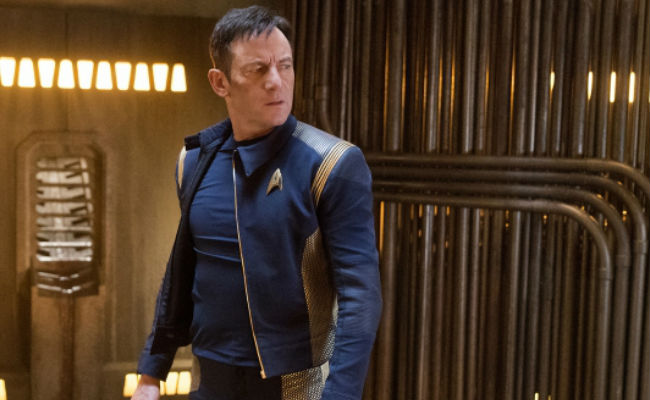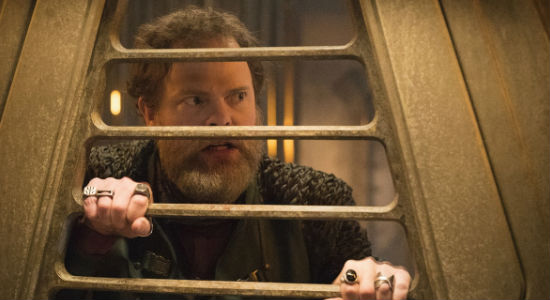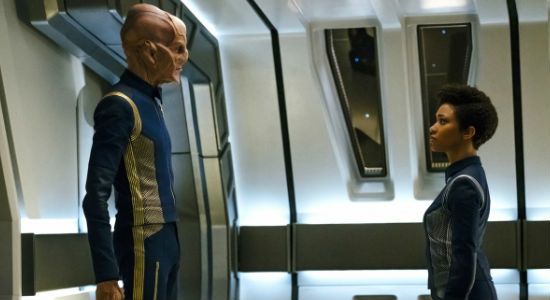
- SPOILERS AHEAD … AND A BIT OF A MUDDY SITUATION …
In “Choose Your Pain”, where Captain Lorca (Jason Isaacs), after being unceremoniously kidnapped by L’Rell (Mary Chieffo), finds himself in a Klingon call with a fellow Starfleet abductee, Lt. Ash Tyler (Shazad Latif) and The Original Series rogue, Harcourt Fenton Mudd (Rainn Wilson), we discover rather conclusively why the Klingon Empire is not exactly the centre of a thriving hospitality industry.
For one thing, they have a penchant for treating their guests/prisoners/anyone who so much looks at them sideways, with the kind of casual brutality that a sociopath might find confronting.
In other words, there is no Geneva Convention, no Good Cop chat followed by a Bad Cop interrogation; nope, it’s straight to “How do you like these insanely bright lights in your extremely light-sensitive eyes, huh? HUH?!” with nary a biscuit or a glass of water to keep you going.
They’ve taken Lorca, of course, because someone has figured out that the Discovery is in possession of a brand new drive, the Displacement-Activated Spore Hub Drive, now with added degrading Tartigrade, that is tipping the war in the Federation’s favour.
“This organisation’s only convicted mutineer is viewed by many, justifiably or not, as the cause of our conflict with the Klingons. To see her avoiding justice does nothing for general morale.” (Katrina Cornwell to Gabriel Lorca)
It could be because the Klingons are damn good spies – L’Rell happily admits to Lorca during their “chat” that she is from a family of spies, a fact that accounts for her super good English – or it, and this is just a wild guess here (haha!), because Lorca is acting like the only kid on campus with a cool, new, crazy fast car.
In other words, rather smugly taken up with his own self-importance and flashing his brand-new blink-in-blink-out drive like there’s no tomorrow.
Admiral Katrina Cornwell (Jayne Brook), who describes herself as Lorca’s friend (an astonishingly rare thing if the Captain’s cheery disposition is any guide), and the rest of the Starfleet drive want to him to step back for a bit, give the Tartigrade a rest and let the rest of the fleet stick it to the Klingons.
Lorca, as you might imagine, is none too pleased with his orders, pointing out a tad petulantly, that he was told he could do what he liked how he liked blah blah blah, but goes along with the edict until, of course, he’s kidnapped and all bets are firmly off.

The entire encounter with Starfleet top brass, after which Lorca finds himself in the Klingon Hilton, is indicative of the type of person Lorca is and the kind of ship he runs.
Given the captaincy of the Discovery after he blew the crew of his previous command, the Buran, to smithereens rather than let them be captured and tortured by the Klingons – that’s some tough lovin’ there my friends; clearly Starfleet is not averse to mass murder in battle if it sounds noble enough – Lorca gives the impression he will do whatever’s necessary to get the job done.
In a time of war, and this likely explain’s Strafleet’s magnanimity towards him, he’s exactly the kind of person who thrives, able to work within his remit the size of the Alpha Quadrant without being hindered by pesky things like a conscience or empathy.
Is he a state-sanctioned sociopath? Quite possibly and while his cool as a cucumber approach sees him not only withstand the Klingon’s lack of a chocolate on a non-existent pillow approach to hosting other races but escape it with Tyler, not Mudd, in tow, and get himself in a position to be rescued by acting Captain Saru (Doug Jones), you have to wonder how well he’ll fare once the war is over.
Not as well as he’d like to think, I guess.
Good news is he does get away, doesn’t spill the beans about the drive, and brings a new whatever-it-takes playmate along with him in the form of Lt Tyler, who survived his 7 months in captivity by being L’Rell’s, ahem, “favourite”.
“Harcourt Fenton Mudd. Thief –”
“Come now.”
“Swindler and con man…”
“Entrepreneur!”
“Liar and rogue.”
“Did I leave you with that impression?” (James T. Kirk and Harcourt Mudd)
The other occupant of the cell, to was left behind on account of being insufferably self-obsessed, Harry Mudd as he’s popularly known, is a man who later comes to prominence in Star Trek: The Original Series, and now as then, is not loved by the Starfleet people with whom he comes in contact.
That’s just fine by him because he has little love for them either, accusing them of living in overly-idealistic ivory towers that have no concern for the mass of people far below them.
Yep, he’s kinda bitter in amongst the camp pomposity and flamboyant self-aggrandisement, and we are given the chance to see him well before Kirk discover a man who claims to have been forced into a life of crime by Klingon war circumstance.
You get the feeling though that Mudd would’ve found a way to feather his own nest come what may since he shows an alarming alacrity to side with whoever can do him the most good; in this case, bugging the cell so his conversations with any captured Starfleet officers are transmitted to L’Rell’s visibly non-existent ears.
Personality and ethical flaws aside, the move by Lorca to abandon him in the prison is very un-Starfleet of old and points to Discovery‘s grittier, darker, more flawed take on proceedings, keeping it very firmly in the Deep Space Nine side of the canon.

Back on the Discovery itself, wrapped up in a well-oiled search for Lorca, overseen by Saru who proves immensely good in the role of leadership – though he laments to Michael Burnham (Sonequa Martin-Green) that he might have been even better if he could have learnt more from Philippa Georgiou (Michelle Yeoh), something denied him – the main game in town, B-plot wise at least, is what to do with the Tartigrade.
You know, the warp-capable creature who’s been imprisoned in order to ensure that the new spore drive takes them exactly where they need to go; it’s damn good at doing that, thanks to its symbiotic links with the spores that suffuse space but it’s taking its toll and Burnham for once, later joined by life partners Lt Paul Stamets (Anthony Rapp) and Dr Hugh Culber (Wilson Cruz) who argue for the Tartigrade to be given much-needed down time.
It won’t be getting that given the need to find Lorca, with Saru adamant that the overwhelming priority is rescuing their Captain with everything else coming a very distant second.
Why Saru, you have the makings of a very good Lorca yet!
Eventually, thanks to a new DNA-mix that can turn a human being into a temporary Tartigrade – Smarts naturally tries it on himself and it works but what of the mysterious man in the mirror huh? What kind of weirdass side effect is he? – the poor beleaguered creature is given its freedom by Burnham who doesn’t get a whole lot to do this episode but does it very well, anyway, even making with Saru in realistic but touching fashion.
“You guys, this is so fucking cool! …I’m so sorry.”
“No, cadet. It is fucking cool.” (Tilly and Stamets)
Naturally we couldn’t finish a review of “Choose Your Pain”, the motto for the Klingon Empire’s equivalent of Airbnb, without noting that this episode, as the preceding show illustrates with crassly-lit neon and shouts from mountaintops, without mentioning that the F-bomb got dropped.
Not once, but TWICE.
It’s a big day for the largely-squeaky clean franchise and speaks to the fact that this is not your grandmother’s Star Trek, not does it belong to Picard or any of the other whiter-than-white captains (a number of who, including Archer, April and Pike are suggested by the computer as leadership role models to a nervous Saru), and that Star Trek: Discovery is determined to be big, brash, bad and a little bit naughty.
What it also is, and this shouldn’t get lost in the “Um-ah they swore!” kerfuffle, is that it’s willing to show that for all its idealism that Starfleet and its people, alien or otherwise, are very much fallible beings, that as noted in earlier doesn’t take one iota away from the franchise’s idealistic origins but rather place in a far more realistic context, something that should stand this very promising show in a very good position moving forward.
- Next week, we boldly head towards “Lethe”, an episode in which Iverse believes we will be given another link back to The Original Series …
“The next episode of Discovery is titled “Lethe,” which could be a reference to a character of the same name who appeared in the original series episode “Dagger of the Mind.” That episode found Captain Kirk and Dr. Noel beaming down to check out a Federation rehabilitation colony on the planet Tantalus V, only to discover terrible mind experiments being performed on the inmates. And one of the former mental patients of Tantalus V was a woman named Lethe (Susanne Wasson). In the opening moments of “Dagger of the Mind,” we’re told Lethe was brought to the colony for rehab but stayed on as a therapist. The truth ends up being somewhat more twisted in the end. She’s also evasive with Captain Kirk about what she was in for.”